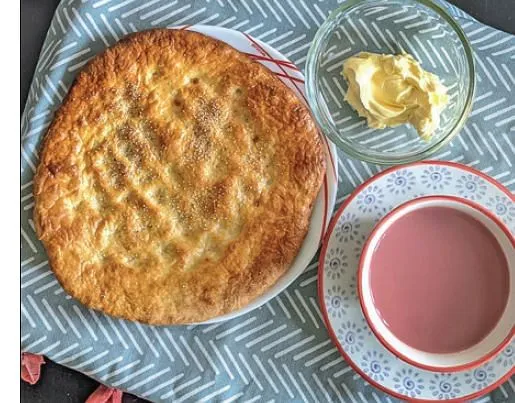BY MASROORA JAN
Diversity and inclusion are gaining momentum in all corners of world, be it policies, corporate world, or welfare society. When both of them are embraced they outperform other strategies and missions.
Let’s now apply these to our food. Diversity supports health; research shows those who consume a diet that includes all major food groups, fruits, vegetables, dairy products, meat, nuts, seeds and whole grains could reduce the risk of type 2 Diabetes and other cancers.
Kashmiri plate
Breakfast is considered as most important meal, as body needs refueling after a long nights sleep. It provides sustained energy throughout morning and prevent us from overeating at lunch. One can include eggs, yogurt, fruits, and fresh juices.
Kashmiri breakfast
It’s nun chai, Kashmiri tea, kept on high boiling point with some milk and salt added to it. An average Kashmiri takes 3 cups a day. WHO recommends 5gms of salt a day, we consume 10 gms – double than recommended.
We need tough and mandatory limit on salts. Too much salt is bad for our health as it leads to water retention, increases volume of blood, increases blood pressure, hypertension, heart problems and kidney issues. Not much diversity we see in our lunch too.
Looking from perspective of average per capita income, majority sticks to basic staple diet as rice and collard greens (hakh) and if pocket at times permits then red meat twice or once a month. Important factor in achieving good health and avoiding diseases is overall diet, not a specified food item. Collard greens has to be part of diet not a diet in itself.
Diet diversity ensures sustainable, environment friendly, holistic healthcare, and keep us disease free and drug free. Food plate of Kashmir doesn’t complete the nutritional composition required for healthy and fit body.
Kashmir shares huge burden of diseases especially non communicable ones. Nutritional deficiencies can lead to variety of disorders; bone, skin, eye, mental, sexual, digestive, and blood disorders. Poor intake of food, adverse life style, faulty food habits, special meal preferences and sedentary life style exacerbate and worsens the prognosis.
Extreme diets are killing us. Breakfast cannot be replaced by nun chai or traditional bakery. Drinking it too much can lead to stone kidneys, weaken immune system, deprive body of essential vitamins, and make us vulnerable to diseases.
Most of the foods consumed by us has negative health nutritional index. We need small changes replacing negative food with positive ones. There is no age to retire as per longevity project. Genetics and diet play a significant role in deciding how long we live.
Kashmir needs urgent need to rearrange the platter. There seems absolute need of vetting food on our plates. Food with all positive scores as per health nutrition index add healthy minutes to our life. These are fruits, starchy vegetables, nuts, seeds, sea food and legumes.
Kashmir is witnessing the rising epidemiology of silent pandemic; there is rise in non-communicable and chronic diseases worst in form of peculiar cancers. Kashmir shares a huge diabetic burden of India. Fighting is not complicated. Prevention looks simple.
Prefer home cooked meal, eat green vegetables, exercise, and embrace diversity and inclusion of cereals, millets, fruits, salad on our platter. Since different foods and food groups are good sources of different macro-and micronutrients, a diversified diet is the best way to assure nutrient adequacy.
Disclaimer: The views and opinions expressed in this article are the personal opinions of the author.
The facts, analysis, assumptions and perspective appearing in the article do not reflect the views of GK.






